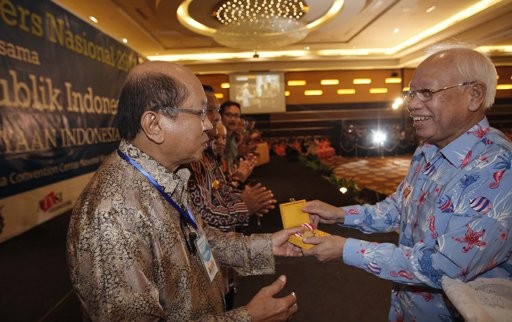Popular Reads
Top Results
Can't find what you're looking for?
View all search resultsPopular Reads
Top Results
Can't find what you're looking for?
View all search resultsSabam Siagian: Demanding but generous in praise
That night, I phoned Pak Sabam in Boston. “I don’t do joint interviews. I do exclusive interviews,” he retorted in a rising voice. Sabam berated me, a twenty-something reporter, for having the gall to ask him, a seasoned senior, to do an interview together.
Change text size
Gift Premium Articles
to Anyone
M
y first get-to-know meeting with Sabam Siagian was in the press room of the United Nations conference hall, New York, in 1978. He filed a story on the 33rd UN General Assembly that September for his paper, the Jakarta afternoon daily Sinar Harapan.
The annual UNGA that runs for three months was not an event that Sabam would cover daily, as he was primarily in the United States for the prestigious one–year Nieman journalism fellowship at Harvard.
I was a reporter for the KNI News Service on a four-month work attachment at the Associated Press, the major US news agency with its head office at the Rockefeller Center. My stint got Ford Foundation funding. KNI, a private cooperative-modeled news agency, distributed AP news in Indonesia.
Heads of government or their foreign ministers would address the UN General Assembly. Later in October, Foreign Minister Mochtar Kusumaatmadja, a law professor and a tireless proponent for the UN Convention on the Law of the Sea, delivered his address.
I approached Minister Mochtar at a house warming with the local Indonesian community at the Indonesian Consulate General and asked for an interview. Mochtar replied he would be open for a joint talk with all Indonesian journalists present in New York.
That night, I phoned Pak Sabam in Boston. “I don’t do joint interviews. I do exclusive interviews,” he retorted in a rising voice. Sabam berated me, a twenty-something reporter, for having the gall to ask him, a seasoned senior, to do an interview together.
He went on to say he knew Mochtar very well since the 1950s. It would be easy for him to pick up the phone and talk to Mochtar. Abruptly, Sabam’s tone mellowed.
“But I like your reporting,” he said plainly. I was surprised and flattered into silence. It stunned me that Sabam would read my work.
KNI chief editor Sumono Mustoffa had seconded me in 1974 to be the Jakarta correspondent of DEPTHnews Asia, the Manila-based service on Asian development news. English-language regional dailies from the Bangkok Post to the Hongkong Standard and the Asian Wall Street Journal subscribed to DEPThnews. Apparently, as Sinar Harapan editor, Sabam had a plug on some of these papers to peruse their stories on Indonesia.
Sabam then signaled I could go on my own and he would not stand in the way. I did get my interview with Minister Mochtar at his three-room suite in the Waldorf Towers at 7 a.m. before he checked out on his final day in New York.
The lead angle was on thawing Sino-Indonesian relations. Jakarta had frozen ties in the aftermath of the abortive 1965 coup blamed on the pro-China Indonesian Communist Party (PKI), banned in 1966. With his lucid legal mind, Mochtar spelled out Indonesia’s concerns and conditions for restoring diplomatic relations with China. AP released the story later that day, Oct. 6, 1978.
My subsequent meetings with Pak Sabam were infrequent and informal. When we did meet, he would smile and extended unsolicited praise. One such occasion was after The Jakarta Post ran an op-ed I had written on Australian-Indonesian relations and a separate profile on Richard Woolcott.
Woolcott was Canberra’s ambassador to Jakarta from 1975 to 1978 at the time of the East Timor issue that strained ties. The write-ups followed a visit I made Down Under with a group of journalists in November 2010. The observation trip was organized by the Public Diplomacy Directorate of the Foreign Affairs Ministry to gauge the state of the bilateral relationship.
As the Post chief editor Endy Bayuni affirms, Sabam is a perfectionist. Sabam could frown and scowl at substandard journalism, but he could lead and inspire to extract the best from reporters.
***
The writer is a journalism instructor at the Dr. Soetomo Press Institute (LPDS), Jakarta.
---------------
We are looking for information, opinions, and in-depth analysis from experts or scholars in a variety of fields. We choose articles based on facts or opinions about general news, as well as quality analysis and commentary about Indonesia or international events. Send your piece to community@jakpost.com.










